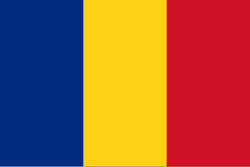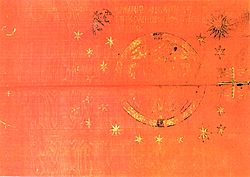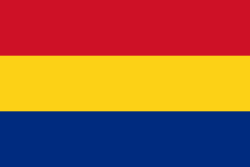Wikimedia Commons has media related to Flags of Romania .
| This article is part of a series on |
| Symbols of Romania |
|---|
 |
The following is a list of flags used to represent Romania.
| This article is part of a series on |
| Symbols of Romania |
|---|
 |
The following is a list of flags used to represent Romania.
| Flag | Date | Use | Description |
|---|---|---|---|
 | 1867–1947, 1989–present | National flag and ensign | Current color scheme established in 1995. Ratio: 2:3 |
 | Vertical variant | Current color scheme established in 1995. |
| Flag | Date | Use | Description |
|---|---|---|---|
 | 1990–present | Presidential flag | Ratio: 1:1 (unclear use status; seen scarcely during Naval Forces day [1] ) |
 | Prime Ministerial flag | Ratio: 1:1 (no longer seen in actual use) | |
 | Member of the Cabinet (early 1990s) | White with the national flag in the canton. The canton relative ratio is 4:5. (no longer seen in actual use) | |
 | 1991–present | Minister of Defense | Ratio: 1:1 |
 | 1990–present | Pilot ensign | National flag bordered white. |
| Flag | Date | Use | Description |
|---|---|---|---|
 | 1992–present | Flag of the Armed Forces | State coat of arms in the center. In the flag edges are two-branch wreaths. |
 | ?–present | Flag of the Romanian General Staff | A yellow flag with coat of arms of Romanian General Staff in the centre with two stars in the left and in the right of coat of arms and surrounded by the four branch elements |
 | ?–present | Flag of the Romanian Land Forces | A red flag with coat of arms of Romanian Land Forces in the centre with two stars in the left and in the right of coat of arms and surrounded by four crossed swords |
 | ?–present | Flag of the Romanian Naval Forces | A dark blue flag with coat of arms of Romanian Naval Forces in the centre with two stars in the left and in the right of coat of arms and surrounded by four anchors |
 | ?–present | Flag of the Romanian Air Force | A light blue flag with coat of arms of Romanian Air Force in the centre with two stars in the left and in the right of coat of arms and surrounded by four air force elements |
 | Naval jack | A light blue flag with the national flag in the canton, a vertically set black-outlined anchor in the quarter | |
| | ?–present | Commissioning pennant | Tri-colour long pennant of blue-yellow-red |
 | ?–present | Chief of the General Staff | A square national tricolour with four white five-pointed stars one above other in the blue stripe. |
 | ?–present | Chief of Naval Staff | A light blue flag with the national flag in the canton, a diagonally set black-outlined anchor in the fly upper quarter and four yellow five-pointed stars in a horizontal line in the lower half |
 | ?–present | Deputy Chief of Naval Staff | A light blue flag with the national flag in the canton, a diagonally set black-outlined anchor in the fly upper quarter and three yellow five-pointed stars in a horizontal line in the lower half |
 | ?–present | Fleet or Flotilla Commander | A light blue flag with the national flag in the canton, a diagonally set black-outlined anchor in the fly upper quarter and two yellow five-pointed stars in a horizontal line in the lower half |
 | ?–present | Major Naval Unit Commander | A light blue flag with the national flag in the canton, a diagonally set black-outlined anchor in the fly upper quarter and one yellow five-pointed stars in a horizontal line in the lower half |
 | ?–present | Naval Unit Commander | A triangular light blue pennant with the national tricolour near the hoist in the central part and in the fly a black outlined anchor, set vertically. |
| Flag | Date | Use | Description |
|---|---|---|---|
 | c. 1593–1611 | Flag of the Principality of Wallachia | |
 | 1658–1659 | Banner of Mihnea III as Prince of Wallachia | |
 | 1678–1688 | Banner of Șerban Cantacuzino as Prince of Wallachia | |
 | 1700s | Naval Ensign of the Principality of Wallachia | |
 | 1758–1761 | Banner of Scarlat Ghica as Prince of Wallachia | |
 | 1802–1806 | Banner of Constantine Ypsilantis as Prince of Wallachia | |
 | 1818–1821 | Banner of Alexander Soutzos as Prince of Wallachia | |
 | 1822–1828 | Banner of Grigore IV Ghica as Prince of Wallachia | |
 | 1822–1828 | Agia flag | |
 | 1831–1849 | Flag of the Principality of Wallachia | |
 | 1834 | War ensign of the Principality of Wallachia | |
 | 1834 | War ensign of the Principality of Wallachia | |
 | 1834 | War ensign of the Principality of Wallachia | |
 | 1834–1861 | Civil ensign of Wallachia | |
 | 1840 | War ensign of the Principality of Wallachia | |
 | 1845 | War ensign of the Principality of Wallachia | |
 | 1848 | Flag of the Provisional Government of the Principality of Wallachia | |
 | 1849–1862 | Flag of the Principality of Wallachia | |
 | 1849 | Flag of the 2nd Battalion of the 1st Infantry Regiment of Wallachia | |
 | 1849 | Standard of the 2nd Cavalry Division of Wallachia | |
 | 1852 | Infantry flag from Prahova County | |
 | 1852 | Infantry flag from Vlașca County | |
 | 1859–1862 | Civil ensign of the United Principalities of Moldavia and Wallachia | Blue-yellow-red horizontal tricolor with blue above. |
 | 1862–1866 | Civil ensign of the United Principalities of Romania | Blue-yellow-red horizontal tricolor with red above. |
 | 1862–1866 | Flag of the Prince of the United Principalities of Moldavia and Wallachia | Blue-yellow-red horizontal tricolor with red above. Coats of arms of Wallachia and Moldavia crowned and surrounded by Romanian tricolors. |
 | 1863–1866 | Army flag of the United Principalities of Romania and after 1866 Principality of Romania | Blue-yellow-red horizontal tricolor with red above. Flying crowned aquila with the coats of arms of Wallachia and Moldavia over it. The aquila holds the sceptre and the sword. In the corners, the monogram of prince Alexandru Ioan Cuza, surrounded by a laurel wreath. On the red scarf it is written: HONOR ET PATRIA. |
 | 1866–1874 | Army flag of the Principality of Romania | Blue-yellow-red horizontal tricolor with company's number in corners and name in the middle. |
 | 1867–1872/3 | Army flag of the Principality of Romania/Princely standard, official model. Used as military ensign. Not used as war or state flag. | Blue-yellow-red vertical tricolor with the country's coat of arms in the middle. |
 | 1867–1875 | Flag of Focșani civic guard. | Blue-yellow-red vertical tricolor with the city's coat of arms in the middle, and company number in corners. |
 | 1877–1878 | Blue-yellow-red vertical tricolor with the medium country's coat of arms in the middle, on a purple background, surrounded by a laurel wreath. In corners, the monogram of king Carol I of Romania, crowned and surrounded by a laurel wreath. Used during the Romanian War of Independence. Ratio: 1:1. | |
 | 1867–1947 | Civil ensign of the Principality/Kingdom of Romania | Blue-yellow-red vertical tricolor with blue near the hoist. |
 | January–March 1948 | Flag of the People's Republic of Romania (never used) | Provisional coat of arms established in January 1948. This is a reconstituted/theoretical model, as the "tractor" coat of arms was never used. |
 | 1948–1952 | Flag of the People's Republic of Romania | The arms had a scroll bearing the letters RPR (no red star). |
 | 1952–1965 | The arms had a scroll bearing the letters RPR and were surmounted by a red star. | |
 | 1965–1989 | Flag of the Socialist Republic of Romania | The arms had a scroll with the word REPUBLICA (left), SOCIALISTĂ (right) and ROMÂNIA (center) and were surmounted by a red star. |
 | 1967–1989 | Flag of Chairman of Councils of State and of Ministers of the Socialist Republic of Romania. | Ratio: 1:1 |
 | 1989–1990 | de facto State flag and civil ensign during the 1989 revolution | The Communist flag with a hole cut out of the middle to remove the coat of arms, as a symbolic protest against the Ceaușescu regime |
| Flag | Date | Use | Description |
|---|---|---|---|
 | 14 April 1867 – 22 March 1872 | Royal Standard of the Domnitor | Ratio: 2:3 |
 | 23 March 1872 – 20 July 1898 | ||
 | 21 July 1898 – 23 April 1922 | Royal Standard of the King | Ratio: 1:1; Ratio between colors: 1:4:1 |
 | 24 April 1922 – 30 December 1947 | Ratio: 1:1 | |
 | Royal Standard of the Queen | ||
 | 19 February 1941 – 30 December 1947 | Royal Standard of the Queen Mother | |
 | 21 July 1898 – 23 April 1922 | Royal Standard of the Crown Prince | Ratio: 1:1; Ratio between colors: 1:4:1 |
 | 24 April 1922 – 30 December 1947 | Royal Standard of the Crown Prince | Ratio: 1:1 |
 | 2007–present | Royal Standard of the Crown Princess (Margareta of Romania) | |
 | 1927–1930 | Royal Standard of the members of the Regency | |
 | 24 April 1922 – 30 December 1947 | Royal Standard of a Member of the Royal House |
| Flag | Date | Use | Description |
|---|---|---|---|
 | 1872–1921 | Army flag of the Principality of Romania/Princely standard, official model. Several other models were used instead (see above). Used as military ensign. Not used as war or state flag. | Blue-yellow-red vertical tricolor with the country's coat of arms in the middle. |
 | 1882–1897 | Army flag of the Kingdom of Romania | Blue-yellow-red vertical tricolor with the country's coat of arms in the middle (slightly modified de facto). In corners, the monogram of king Carol I of Romania, crowned and surrounded by a laurel wreath. Ratio: 1:1. |
 | 1897–1902 | Blue-yellow-red vertical tricolor with the country's coat of arms in the middle (slightly modified de facto). In corners, the monogram of king Carol I of Romania, crowned and surrounded by a laurel wreath. | |
 | 1902–1914 | Blue-yellow-red vertical tricolor with the country's coat of arms in the middle (slightly modified de facto), surrounded by a laurel wreath. In corners, the monogram of king Carol I of Romania, crowned and surrounded by a laurel wreath. | |
 | 1914–1921 | Blue-yellow-red vertical tricolor with the country's coat of arms in the middle (slightly modified de facto), surrounded by a laurel wreath. In corners, the monogram of king Ferdinand I of Romania, crowned and surrounded by a laurel wreath. | |
 | 1921–1927 (1930?) | Army flag of the Kingdom of Romania. First awarded in 1926 | Blue-yellow-red vertical tricolor with the country's coat of arms in the middle, surrounded by a laurel wreath. In corners, the monogram of king Ferdinand I of Romania, crowned and surrounded by a laurel wreath. |
 | 1930–1940 | Army flag of the Kingdom of Romania | Blue-yellow-red vertical tricolor with the country's coat of arms in the middle, surrounded by a laurel wreath. In corners, the monogram of king Carol II of Romania, crowned and surrounded by a laurel wreath. |
 | 1940–1947 (and 1927–1930?) | Blue-yellow-red vertical tricolor with the country's coat of arms in the middle, surrounded by a laurel wreath. In corners, the monogram of king Michael I of Romania, crowned and surrounded by a laurel wreath. | |
 | 1922–1947 | Naval ensign. Not used as war or state flag. | Blue-yellow-red vertical tricolor with the country's middle coat of arms in the center. |
 | Naval jack | Yellow field with red border and the country's middle coat of arms in the center. |
| Flag | Date | Use | Description |
|---|---|---|---|
  | 1952–1965 | Battle flag of Romania | |
  | Air Force flag of Romania |
| Flag | Date | Use | Description |
|---|---|---|---|
 | 1990–present | Bucharest (capital city) | |
 | Arad (municipality) | A bright yellow flag with a blue horizontal wavy strip, symbolizing the Mureș river and the city coat of arms centered. | |
 | Alba Iulia (municipality) | ||
 | 1992–present | Brașov (municipality) | |
 | 1990–present | Carei (municipality) | |
 | 1997–present | Constanța (municipality) | |
 | 1992–present | Oradea (municipality) | |
 | 1998–present | Târgu Mureș (municipality) | |
 | Sibiu (municipality) | ||
 | Câmpulung (municipality) | ||
 | Bacău (municipality) | ||
| Flag | Date | Party | Description |
|---|---|---|---|
| Current | |||
 | 2014–present | National Liberal Party | |
 | 2014–present | Social Democratic Party | |
 | 2023–present | Alliance for the Union of Romanians | |
 | 2023–present | The New Right | |
 | 2004–present | Democratic Union of Hungarians in Romania | |
 | 2025–present | Social Justice Party | |
| Former | |||
 | 2015–2022 | United Romania Party | |
 | 1993–2015 | Everything For the Country Party | |
 | 1965–1989 | Romanian Communist Party | |
| | 1938–1940 | National Renaissance Front | |
 | 1944–1953 | Ploughmen's Front | |
 | 1932–1934 | National Socialist Party | |
 | 1927–1941 | Iron Guard | |
 | 1930–1947 | National Peasants' Party | |
 | 1922–1946 | Democratic Nationalist Party | |
 | 1925–1935 | National-Christian Defense League | |
 | 1935–1938 | National Christian Party | |
 | 1935–1938 | Swastika of Fire | |